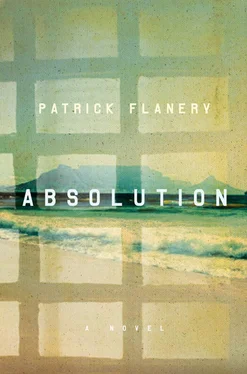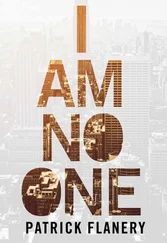As quickly as you arrive you disappear into the shadows, leaving only Nora, who flies on currents of white noise, the sound of wind coming down the mountain or the air of this house being stirred by its hidden rotors.
She arrives with the murmur of two cushions compressing, air being forced out by her weight, the ripping sound of two pieces of fabric rubbing warp against weft. She sits on the chair nearest my bedroom door. I know immediately it is Nora, and her presence is so real that my brain, lesioned by trauma, tells my hand to reach for the panic button until I hear Nora’s voice in my head, warning me that she will be long gone by the time the security guards have arrived and I will be made to look like a mad old woman, asked if I have been sleeping well, if I have spoken to my doctor about the things I think I’ve seen, if I am taking all my medication. I take no medication.
‘Then perhaps you should,’ she says.
Nora’s voice, the sing-song amusement of young womanhood, consumes me in an acid bath. I know it as well as the voice of my parents and your own lost voice, Laura. I can summon you all to ring in my mind, you and your brother, your father, my dead and my living. I can speak all of you aloud in my own feminine way. And now I learn I can summon you all too well. I want to send you back. I have made a mistake! This is all the proof I need. I accept you are dead, now leave the living in peace.
My sister, the Nora I have unwittingly conjured, has a sense of humour that she lacked in life. She sits with me for hours through this night, passing comment on my works, all the books she never had the chance to read, speculating on their meaning. She has turned herself into an eternal reader, benefitting from the underworld’s great lending library. Rightly, she finds herself in each of my books, appearing in one form or another, sometimes young, more often old, male and female, human or lesser animal. Once I cast her as a hurricane, a storm of such unpredictable ferocity that it defeated the meteorologists and destroyed an unprepared swath of American shoreline. Another time she was a drought of long duration, teasing the suffering heroine with storm clouds that never broke into rain. She is an admirably flexible talent, bending to suit my purpose.
She wears the yellow taffeta cocktail dress in which I last saw her, its skirt arranged coquettishly around her knees, spine erect, lips pursed into her customary pout. Her skin remains firm where mine is now loose, her eyes bright and clear where mine have lately begun to dim, to cloud, wandering independent of my will. The only change I see in her now is the presence of a round, dark cavity. It is a perfect circle on the left side of her face: a hole into which one might insert a finger. Around it a reddish-black fire rages in quiet stillness across the surface of her pale skin. It is the hole for which I must bear responsibility, the fatal orifice and eternal flame burning from beneath a marble slab. In the last moment of her life it opened to consume three-quarters of her face.
‘I have only been speaking about myself. But how are you , dear sister?’ she finally says after hours of explicating my texts. ‘By the by that last book was a triumph if I may say so, but what a lot of obscenities. Mother and Father were not at all sure what to make of the language.’ After another quarter hour of such annoying small talk — not quite my idea of a proper haunting — she falls silent and approaches me, her movements halting as if her bones were centuries older than my own, and leans over, placing her hand against my heart. I feel pressure as through the cold numbness of anaesthesia, and then that pressure penetrates my skin and wraps itself around the beating organ, slowing the heart to a less panicked time. I wish I could say that her trick does not frighten me, but in fact it does. My hands tremble; I mewl like a kitten and ask her to stop.
I try to consider the situation with my usual logic. It occurs to me that I might actually be asleep, and that I am experiencing a new kind of dream giving vent to the guilt I have carried for so long. The problem with this logic is that my customary stress dreams are always of an entirely different order and have no physical effects.
Some weeks ago I dreamed that I was visiting a busy European city, half Paris, half London, walking from one side of the metropolis to the other, at once escaping some ill-defined threat and running towards an appointment whose exact nature I could not discern, but which I knew I could not afford to miss. At the intersection of two wide boulevards I was compelled by a local guide, a short woman with a brown pageboy and wire-rimmed spectacles who spoke with a stammer, to take a detour into a subterranean museum, the entrance to which was red and mouth-like, the walls scarlet and stairs black — altogether a quite unimaginative rendering of hell — from whence clouds of steam billowed. I was wearing a wool coat that I had recently bought in my waking life, and which I decided to leave at the entrance, knowing it would be too hot to wear inside. I assumed I would only be a few moments and that no harm could come to it. Once I had made my way down into the museum (which had exhibits that made little sense — dioramas of civic worthies who had been recast by history as traitors and rogues, a tableau of slum clearances, a collection of the skulls of murder victims housed in reliquary boxes), the air cooled by several degrees and I began to shiver. At the same time that I felt need of my coat once again, I realized that in order to continue my journey I would have to progress to the very end of the museum, on the other side of the river that bisected the city. Only forward movement was allowed. It was impossible to turn around and retrieve my coat, and in realizing this I felt the tour guide had tricked me into abandoning the very thing I would need most on my visit. It was forbidden to go back to the entrance and every time I attempted to do so I found that the museum itself had closed off its passages behind me, walls and gates and barriers rolling themselves into place. The coat was lost — I had no idea on which street the entrance to the museum had been, meaning that I would, in all likelihood, never retrieve it. This sudden loss filled me with a dread disproportionate to the real value of the thing — coats and clothes are not, moreover, items that much trouble me in waking life. A garment has utility and may be replaced when worn out or, indeed, lost. I have never endowed my own clothing with sentimental attachment.
Last night I dreamed that I had agreed to reprise a role I’d played as a girl in a school production of a holiday-themed play, filling in for an ill performer as the adolescent love interest of the main character. But as the night of the performance approached, I realized I had failed to study the script and knew none of the character’s lines. Nor could I remember the blocking, which, it occurred to me, would have changed anyway since it was a new interpretation of the story. More significantly, at the last minute I agreed to take the unsympathetic lead role, which I had never studied. The character had the most lines and was on stage for nearly every minute of the play. As I was panicking about learning the script, which I could not even locate, an old lover phoned to ask if he should come to the performance and I insisted, yes, he must come, and he must bring his mother (a common woman with a weakness for Victorian sentimentality, she had been a pub landlady in London’s East End) because she would love it — a haunting production, it was done with the utmost professionalism, with extraordinary sets and wonderful performers, a genuine evocation of nineteenth-century Christmas festivity. When I hung up I felt sick, knowing there was nothing remotely professional about my failure to prepare my lines.
Читать дальше












